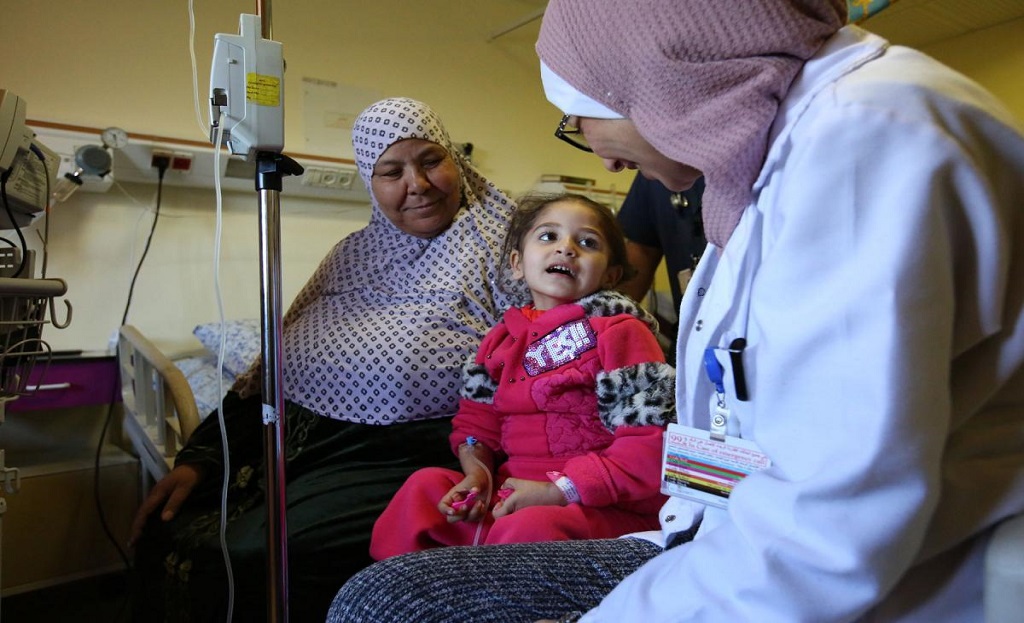Farouq Abu al-Naja was supposed to attend school for the first time this year, but he died five days before the beginning of the school year, following months of ‘Israeli’ delays in granting him an exit permit to access urgent medical treatment.
Faraan: Six-year-old Abu al-Naja, a resident of the Khan Younis area of southern Gaza, died on Wednesday, 24 August, two weeks after his last delayed appointment.
“We submitted two applications [to the ‘Israeli’ authorities] to transfer Farouq to a hospital in al-Quds. For eight months, we kept receiving ‘request under review’ replies,” his mother, Kholoud Abu al-Naja, told Middle East Eye. Abu al-Naja suffered from brain atrophy and was referred by the Palestinian Ministry of Health to Hadassah Hospital in al-Quds for urgent medical treatment. After he received financial coverage from the Palestinian Authority [PA], he had only needed a permit from ‘Israel’s’ Gaza Coordination and Liaison Administration [CLA] to allow him to exit Gaza through the Beit Hanoun [Erez] crossing in the east of the Strip.
“His health was deteriorating rapidly before my eyes while I was waiting desperately for their approval,” his mother said. “Seeing him like this, I was totally helpless. He first lost the ability to walk, then to move, then to talk and eat, then he was merely a dead body on a hospital bed. But whenever he opened his eyes, he could recognize me.”
Transfer, then permit delay
After his health deteriorated, Abu al-Naja was transferred to the European Hospital in Khan Younis, while his family was completing the “repeated and prolonged procedures” to get the permit. “The first time, we listed my mother to accompany him, because she is an elderly woman and is therefore more likely to get approval. But we were surprised to receive a text message one day before the appointment saying that her and his applications were pending approval.”
In their second and last attempt, Abu al-Naja’s family listed the names of his mother and grandmother as companions to increase the chances of getting at least one permit approved, but the applications went unanswered. “We followed up with the Ministry of Health as well as human rights organizations that communicate with the competent authorities there, but in vain,” his mother said. “He died at the hospital before my eyes. I do not know what in the case of a dying six-year-old child needed all this time for review.”
Since January, Gaza patients in need of exit permits have been facing even longer delays in receiving responses to their permit applications, as the CLA has refused to respond to legal representatives of Palestinians in Gaza, including human rights organizations and lawyers, according to the ‘Israeli’ human rights organization Gisha. The legal representatives instead receive automated responses from the CLA asking them to refer their requests to the Palestinian Civil Affairs Committee [PCAC], a PA-run body in Gaza that serves as a channel for applications without the capacity to represent the applicants.
“The ‘Israeli’ authorities’ conduct has grave ramifications for Gaza’s patients, as they effectively block them from accessing urgent and life-saving medical treatment, putting lives at risk,” Gisha’s spokesperson, Shai Grunberg, told MEE. “The irregular, selective nature of the CLA’s responses, as well as their prolonged delays in responding to permit applications in general, continue to delay and sometimes effectively deny people’s access to medical treatment that isn’t available in the Strip,” she said.
“‘Israel’s’ conduct reflects a fundamental failure to acknowledge its legal obligations towards Gaza residents, putting lives and well-being at risk.” According to the World Health Organization, 1,898 patients from Gaza were referred to health care services in the occupied Palestinian territory in July, of whom 36 percent were delayed access to care, 11 patients were called by ‘Israeli’ intelligence officers for security interrogation, and 371 were forced to travel without companions.
‘Death sentence for Gaza patients’
Kamal al-Shanti, 54, is afraid he will face the same fate as Abu al-Naja, after his third appointment has been delayed. He suffers from aortic valve stenosis, a progressive disease that restricts the blood flow in the heart and causes severe pain and breathing difficulties.










